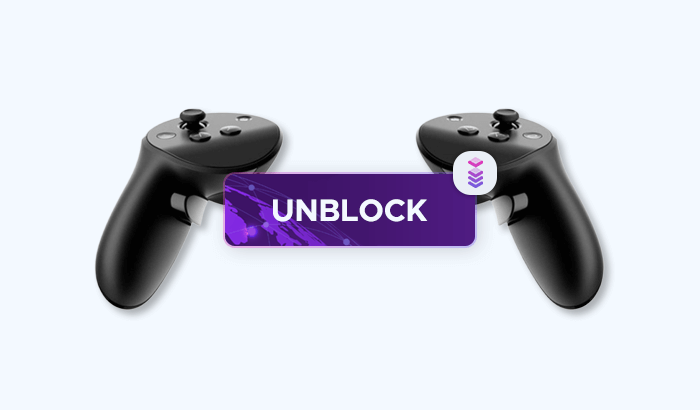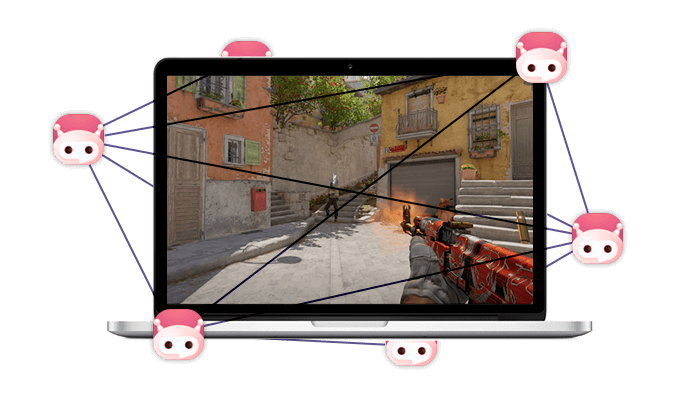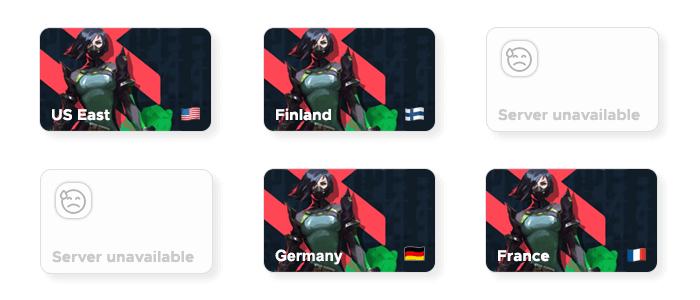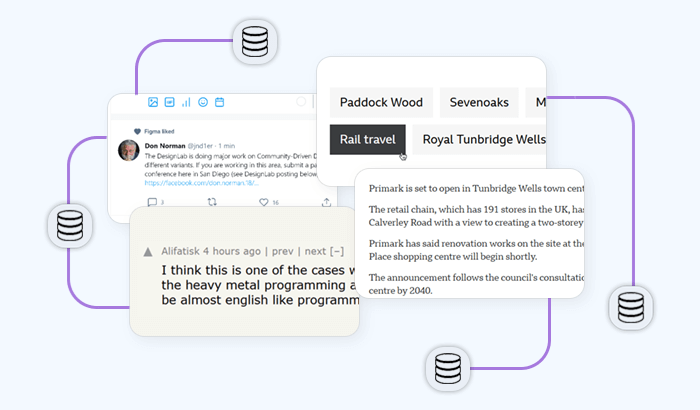
Gaming proxies are a valuable tool for competitive and casual players alike, offering benefits ranging from security enhancements to performance improvements. However, choosing a high-quality proxy provider is essential to avoid unstable connections and detection by anti-cheat systems – let’s see why Infatica is a great pick for that!
How Proxies Work in Gaming
A proxy server acts as an intermediary between a player’s gaming device (PC, console, or mobile) and the game’s servers. When a player connects through a proxy, their gaming data packets are first sent to the proxy server, which then forwards them to the game server. The game server processes the request and sends a response back to the proxy, which relays it to the player.
1. Data Routing

When a game is played online, it constantly exchanges data packets between the player and the game server. A proxy modifies this route by:
- Receiving the player's outbound data packets (movement commands, actions, etc.).
- Assigning a new IP address (the proxy’s IP) to the packets.
- Forwarding them to the game server on the player's behalf.
- Receiving response packets from the game server (such as enemy positions or in-game events).
- Relaying those packets back to the player.
This process happens in milliseconds, ideally without noticeable delays.
2. IP Masking and Geolocation Control
Each request sent through a proxy appears as if it originates from the proxy server rather than the player’s actual location. This is achieved by modifying the request’s IP headers. In gaming, this allows players to connect to servers in different regions by using a proxy with an IP address from the desired location.
3. Protocol Handling
Most online games use UDP (User Datagram Protocol) instead of TCP (Transmission Control Protocol) because UDP is faster and more efficient for real-time applications. Proxies that support gaming must be capable of handling UDP traffic, ensuring that packets are forwarded quickly without retransmission delays.
4. NAT and Firewall Traversal
Game servers often implement firewalls or NAT (Network Address Translation) restrictions to prevent unauthorized access. Proxies can act as a bridge, bypassing these restrictions by encapsulating game traffic in a format that the server allows. Infatica proxies use tunneling protocols (such as SOCKS5) to achieve this.
The Benefits of Using Proxies for Gaming
Proxies are widely used in online gaming to enhance performance, security, and accessibility. By acting as an intermediary between a player and the game server, a proxy can optimize connection stability, protect against cyber threats, and enable access to restricted servers.
Protection Against DDoS Attacks

In competitive gaming, Distributed Denial-of-Service (DDoS) attacks are a common tactic used to disrupt opponents by overwhelming their internet connection with excessive traffic. A proxy server helps mitigate this risk by masking the player's real IP address. If an attacker attempts to launch a DDoS attack, they will target the proxy’s IP instead of the player’s actual network, preventing disruption to the player’s connection.
Reduced Latency and Improved Connection Stability
While proxies introduce an additional step in data transmission, they can sometimes reduce latency rather than increase it. This is especially true if a player uses a proxy server located in the same country or region as the game’s servers. The key reasons behind this include:
- Optimized routing: Some proxies use high-speed infrastructure to find the shortest path between the player and the game server, avoiding network congestion.
- Bypassing ISP throttling: Some ISPs throttle gaming traffic, slowing down connections. A proxy can obfuscate the traffic to prevent throttling, resulting in a smoother experience.
- Reducing packet loss: A well-configured proxy can ensure more stable data transmission, minimizing lag spikes and packet loss.
Access to Geo-Restricted Game Servers

Many games have region-locked servers, preventing players from accessing certain versions of the game or playing with friends from other countries. A gaming proxy allows users to connect to servers in different locations by assigning them an IP address from the desired region. This can be useful for:
- Playing on foreign servers (e.g., connecting to a Japanese server while being in Europe).
- Accessing early game releases that are available in specific regions before a global launch.
- Bypassing regional bans imposed by game developers or publishers.
Multi-Account Management
Some online games restrict users from having multiple accounts on the same IP address to prevent abuse. However, professional gamers, traders (in MMO economies), and esports teams often need multiple accounts for practice or business purposes. A proxy allows users to manage multiple accounts by assigning different IP addresses to each login session, reducing the risk of detection or bans.
Enhanced Privacy and Security

Gaming proxies can shield players from various security risks, such as:
- Avoiding doxxing: Malicious players sometimes track IP addresses to find personal information about opponents. A proxy prevents this by hiding the player’s real IP.
- Preventing SWATTING: High-profile streamers and professional players have been victims of SWATTING attacks, where someone calls emergency services to their home using their IP-based location. A proxy makes it harder for attackers to pinpoint a player’s real address.
- Securing sensitive transactions: Many games involve in-game purchases and trading. A proxy can add a layer of security to prevent man-in-the-middle attacks.
Bypassing IP Bans
If a player encounters an automatic ban from a game or a server due to an IP restriction, a proxy can provide a new IP, allowing them to regain access. However, this should be used responsibly, as some bans are enforced for legitimate reasons.
Playing Games on Restricted Networks
Some workplaces, schools, or public networks block access to gaming servers. A proxy can bypass these restrictions by rerouting traffic, making it appear as regular web activity rather than gaming traffic.
Comparison of Proxy Types for Gaming
| Proxy Type | Best For | Pros | Cons |
|---|---|---|---|
| Residential Proxies | Bypassing IP bans, reducing detection risks |
✅ Uses real IPs from legitimate ISPs, making them harder to detect and block. ✅ Works well for games with strict anti-cheat systems. |
❌ Generally more expensive than datacenter proxies. ❌ Can be slightly slower due to reliance on real residential networks. |
| ISP (Static) Proxies | Competitive gaming, stable long-term sessions |
✅ Static IPs assigned by real ISPs (faster than residential proxies). ✅ Good balance between speed and legitimacy. ✅ Suitable for long gaming sessions without frequent IP changes. |
❌ More expensive than datacenter proxies. ❌ Can still be detected in some cases if misused. |
| Datacenter Proxies | Reducing ping, faster speeds, and multi-account gaming |
✅ Extremely fast and stable. ✅ Cost-effective compared to residential and ISP proxies. ✅ Works well for latency-sensitive games. |
❌ Easier to detect and block, as they don’t originate from real ISPs. ❌ Less effective for bypassing bans or geo-restrictions. |
| Mobile Proxies | Avoiding bans and playing mobile games securely |
✅ Uses real mobile IPs from 4G/5G networks, making detection difficult. ✅ Great for mobile gaming and cloud-based game streaming. |
❌ More expensive due to mobile network costs. ❌ Slightly higher latency than datacenter proxies. |
Which Proxy Should You Choose?
- For reducing bans and avoiding detection: Residential or Mobile proxies.
- For long-term stable gaming sessions: ISP proxies.
- For the fastest and cheapest option: Datacenter proxies.
- For playing mobile games securely: Mobile proxies.
How to Set Up Proxies for Gaming on Different Devices
Proxies can be configured on various gaming devices, including PCs, Macs, gaming consoles, and mobile phones. Below are step-by-step instructions for each platform.
Setting Up a Proxy on Windows (PC)
- Open Settings: Press
Win + Iand go toNetwork & Internet→Proxy. - Scroll down to Manual proxy setup.
- Toggle Use a proxy server to
On. - Enter the proxy IP address and port provided by Infatica.
- Click
Save. - Restart your game for the proxy settings to take effect.
Setting Up a Proxy on macOS
- Go to System Settings: Click the Apple Menu →
System Settings→Network. - Select the network connection (`Wi-Fi` or
Ethernet). - Click
Details→Proxies. - Enable the SOCKS5, HTTP, or HTTPS proxy, depending on what your provider offers.
- Enter the proxy IP address and port from Infatica.
- Click
OKand apply changes.
Setting Up a Proxy on Gaming Consoles (PS5, PS4, Xbox, Nintendo Switch)
Some gaming consoles do have built-in network settings, but it might be easier to configure a proxy on a router:
- Access router settings: Open a browser and go to your router’s IP address (e.g.,
192.168.1.1). - Log in: Enter your router’s username and password.
- Find proxy settings: Look for
WAN,LAN, orProxy settings(varies by router) and enable manual proxy and enter the proxy IP and port. - Save and restart: Apply changes and restart your router.
Setting Up a Proxy on Mobile Devices (Android & iOS)
For Android:
- Go to
Settings→Wi-Fi. - Tap and hold your current Wi-Fi network →
Modify network. - Scroll down and select
Advanced options. - Under
Proxy, chooseManual. - Enter the proxy IP and port from Infatica.
- Tap Save and restart your game.
For iOS (iPhone & iPad):
- Go to
Settings→Wi-Fi. - Tap the
(i)icon next to your connected Wi-Fi network. - Scroll down to
HTTP Proxyand selectManual. - Enter the proxy IP and port.
- Tap Save, then restart your game.













